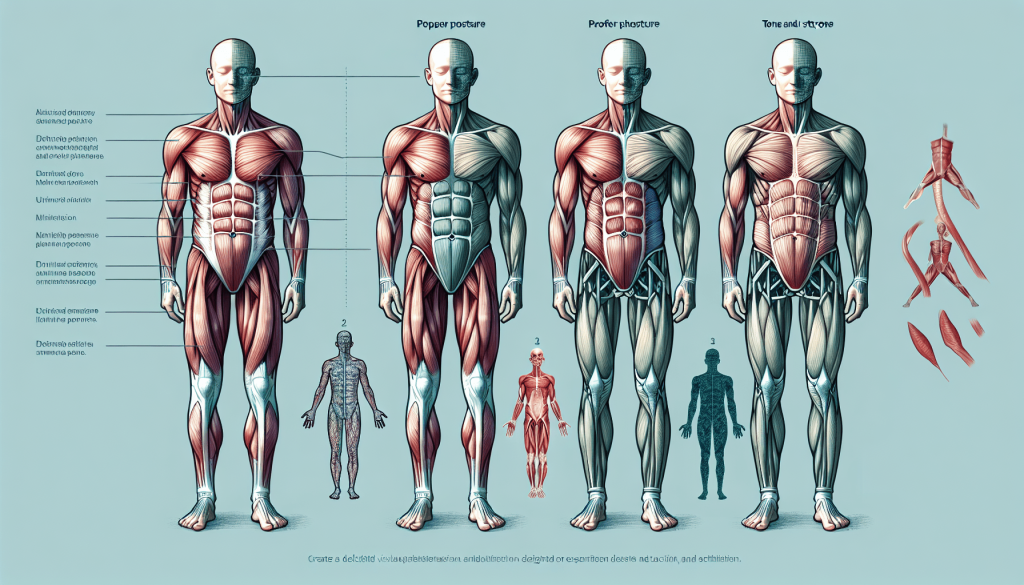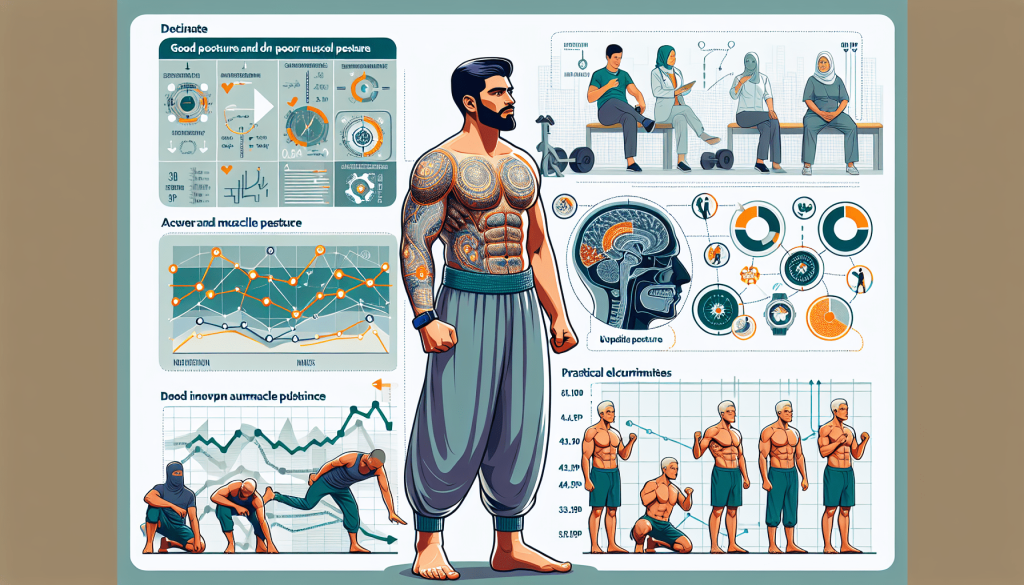Have you ever wondered how your posture can impact the appearance and strength of your abdominal muscles? Many people have questions about how to achieve those coveted six-pack abs and build a strong core, and understanding the role posture plays in this process is crucial. Your posture not only affects the way your abs look but also plays a major role in the overall strength and functionality of these muscles. In this article, we will explore the connection between posture and abs, and provide you with valuable insights and tips on how to enhance both the appearance and strength of your abs through proper posture.

Understanding the Importance of Posture
The role of posture in overall body alignment
Posture plays a crucial role in maintaining proper body alignment. When you have good posture, your body is in a neutral position, with your spine aligned properly and your muscles balanced and relaxed. This alignment allows your body to function at its best, promoting optimal movement, coordination, and efficiency.
Impact of poor posture on abdominal muscles
Poor posture can have a significant impact on the strength and appearance of your abdominal muscles. When you slouch or hunch your shoulders forward, it causes your abdominal muscles to relax and become weaker. This can lead to a decrease in abdominal strength and definition, making it more difficult to achieve those coveted six-pack abs.
Posture and Abdominal Appearance
Effects of posture on the visual appearance of abs
Your posture has a direct impact on the visual appearance of your abs. When you have good posture, your abdominal muscles are elongated and not compressed, giving them a leaner and more defined look. On the other hand, poor posture can cause your abs to appear rounded or protruding, hiding their true shape and definition.
The influence of posture on abdominal definition
Proper posture enhances the definition of your abdominal muscles. When you maintain good posture, your abs are engaged and pulled in, creating a flatter and more sculpted appearance. However, slouching or having poor posture can cause your abs to relax and lose their definition, making it harder to achieve that chiseled look.
The impact of posture on abdominal bloating
Your posture can also affect abdominal bloating. When you have poor posture, you may inadvertently compress your abdominal organs, causing digestive issues and bloating. Correcting your posture can help alleviate these symptoms and promote a flatter stomach.
Posture and Abdominal Strength
The relationship between posture and core strength
Posture and core strength are closely intertwined. Good posture automatically engages your core muscles, including your abdominal muscles, to maintain proper alignment. This continuous activation of the core muscles helps strengthen them over time, leading to improved abdominal strength and stability.
How posture affects muscle activation during abdominal exercises
Proper posture is crucial when performing abdominal exercises. When you maintain good posture during these exercises, it ensures that the targeted muscles are activated effectively and efficiently. On the other hand, poor posture can shift the focus away from the abs, leading to less effective workouts and slower progress.
The role of posture in maintaining abdominal stability
Posture plays a vital role in maintaining abdominal stability. When you have good posture, your core muscles provide a stable base for your torso, allowing for better balance and control. This stability is essential for preventing injuries, improving posture-related pain, and maximizing the effectiveness of your abdominal workouts.
Correcting Postural Imbalances
Recognizing common postural imbalances
Postural imbalances can manifest in various ways, such as rounded shoulders, forward head posture, or an excessive curvature of the spine. Recognizing these imbalances is the first step towards correcting them. Pay attention to your body’s alignment and seek professional guidance if you suspect any postural issues.
Exercises and techniques to improve posture
There are several exercises and techniques that can help improve posture. Strengthening exercises for the back and core muscles, stretching exercises to release tension, and practicing proper alignment during everyday activities can all contribute to better posture. It’s important to consult with a fitness professional or physical therapist to develop a personalized plan suited to your specific needs.
The importance of incorporating postural correction into ab workouts
Incorporating postural correction into your ab workouts is crucial for maximum benefit. By focusing on maintaining good posture during exercises, you engage the correct muscle groups and avoid compensatory movements that can lead to imbalances and injuries. Practice mindful movement and regularly assess your posture while performing ab exercises.

Posture and Abdominal Workout Effectiveness
How posture affects the efficiency of abdominal exercises
Posture significantly impacts the efficiency of your abdominal exercises. When you have good posture, you can target the abdominal muscles more effectively, ensuring proper engagement and activation. On the other hand, poor posture may result in less effective workouts, as the focus shifts away from the target muscles.
The role of posture in preventing injury during ab workouts
Maintaining good posture during ab workouts is essential for preventing injuries. Proper alignment reduces strain on the spine, decreases the risk of muscle imbalances, and promotes safer movements. By prioritizing good posture, you can minimize the risk of strain, sprains, and other injuries during your abdominal workouts.
Maximizing results by optimizing posture during workouts
Optimizing your posture during workouts can significantly enhance your results. By consciously maintaining good posture, you engage the correct muscles, increase the intensity of the exercises, and ensure proper form. This optimization allows you to maximize the effectiveness of your workouts and achieve your desired abdominal strength and appearance.
Developing Good Posture Habits
Tips for maintaining proper posture throughout the day
Maintaining proper posture throughout the day requires conscious effort and awareness. Some tips to help you include sitting up straight, keeping your shoulders relaxed and aligned with your ears, standing tall with your weight evenly distributed, and avoiding prolonged periods of sitting or standing. Frequent posture checks and gentle reminders can help you develop good posture habits.
Utilizing ergonomic equipment to support good posture
Ergonomic equipment can provide support and help maintain good posture. When sitting, using an ergonomic chair with lumbar support and an adjustable height can encourage proper alignment. Additionally, ergonomic accessories like height-adjustable desks and keyboard trays can promote good posture while working at a desk or computer.
Incorporating postural exercises into daily routine
Incorporating postural exercises into your daily routine is essential for improving and maintaining good posture. Exercises that focus on strengthening the back, core, and muscles that support good posture can be integrated into your warm-up or cool-down routines. Additionally, exercises like yoga and Pilates can help improve posture, flexibility, and balance.

Posture and Functional Movement
The impact of posture on daily activities
Posture influences your daily activities in various ways. Maintaining good posture during activities such as walking, running, or lifting objects promotes proper body mechanics and reduces strain on the muscles and joints. Good posture allows for optimal movement patterns and enhances overall functional performance in daily tasks.
How good posture enhances overall physical performance
Good posture enhances overall physical performance by optimizing the body’s alignment and movement efficiency. When your body is in proper alignment, it can generate more power, maintain better balance, and reduce the risk of injuries. Whether you’re participating in sports, fitness activities, or simply carrying out everyday tasks, good posture is essential for optimal performance.
The relationship between posture and injury prevention
Posture plays a crucial role in injury prevention. Maintaining good posture distributes stress and forces evenly throughout your body, reducing the strain on individual muscles and joints. Proper alignment helps minimize the risk of overuse injuries, joint pain, and postural imbalances that can lead to more severe injuries over time.
Posture and Psychological Benefits
The influence of posture on mood and confidence
Posture has a significant influence on your mood and confidence levels. When you stand tall with good posture, it can enhance your mood, boost self-esteem, and elevate your overall confidence. Research has shown that maintaining an upright posture can lead to increased feelings of positivity, assertiveness, and improved self-image.
The psychological effects of standing tall and maintaining good posture
Standing tall and maintaining good posture can have psychological benefits. It can increase your self-assurance, make you feel more open and approachable, and project an image of confidence to others. On the other hand, slouching or having poor posture can convey a lack of confidence and negatively impact your psychological well-being.
Boosting self-esteem through improved posture
Improving your posture can have a direct impact on your self-esteem. When you actively work on correcting your posture and see the positive changes in your appearance and physical performance, it can boost your self-confidence. Feeling more confident in your body can improve your overall self-esteem and positively influence various aspects of your life.

Recognizing the Warning Signs of Poor Posture
Common symptoms of poor posture
Poor posture can manifest in various symptoms, including rounded shoulders, a forward head posture, back or neck pain, muscle imbalances, and reduced mobility. These symptoms are often caused by prolonged periods of slouching, sitting with improper alignment, or repetitive movements with poor form.
Identifying posture-related issues through physical examination
A physical examination can help identify posture-related issues. A healthcare professional or physical therapist can assess your posture, range of motion, muscle imbalances, and functional movement patterns. They can provide valuable insights and recommend specific exercises, stretches, or treatments to address any postural problems identified.
Seeking professional help for severe postural problems
If you are experiencing severe postural problems or chronic pain, it is crucial to seek professional help. A healthcare professional, such as a physical therapist or chiropractor, specializes in diagnosing and treating postural issues. They can provide personalized treatment plans to address your specific needs and help you correct your posture effectively.
Maintaining Postural Awareness for Long-Term Benefits
The importance of ongoing posture checks
Maintaining ongoing postural awareness is essential for reaping the long-term benefits of good posture. Regularly checking your posture throughout the day can help you make real-time adjustments and maintain proper alignment. Incorporating posture check-ins into your daily routine can prevent the development of bad habits and ensure continuous progress.
Incorporating posture-friendly habits into daily life
In addition to regular posture checks, incorporating posture-friendly habits into your daily life is crucial for long-term benefits. This includes practicing good posture during all activities, engaging in regular exercise and stretching routines, and being mindful of your body’s alignment. By making these habits a part of your lifestyle, you can maintain optimal posture and enjoy its numerous benefits.
The long-term impact of good posture on abs and overall health
Developing and maintaining good posture has long-lasting effects on your abs and overall health. By improving your posture, you strengthen your core muscles, enhance the appearance and definition of your abs, and reduce the risk of postural imbalances and associated pain. Good posture also promotes spinal health, better breathing, improved digestion, and overall physical well-being. Embracing good posture as a lifelong habit can lead to lasting benefits for both your abs and overall health.






